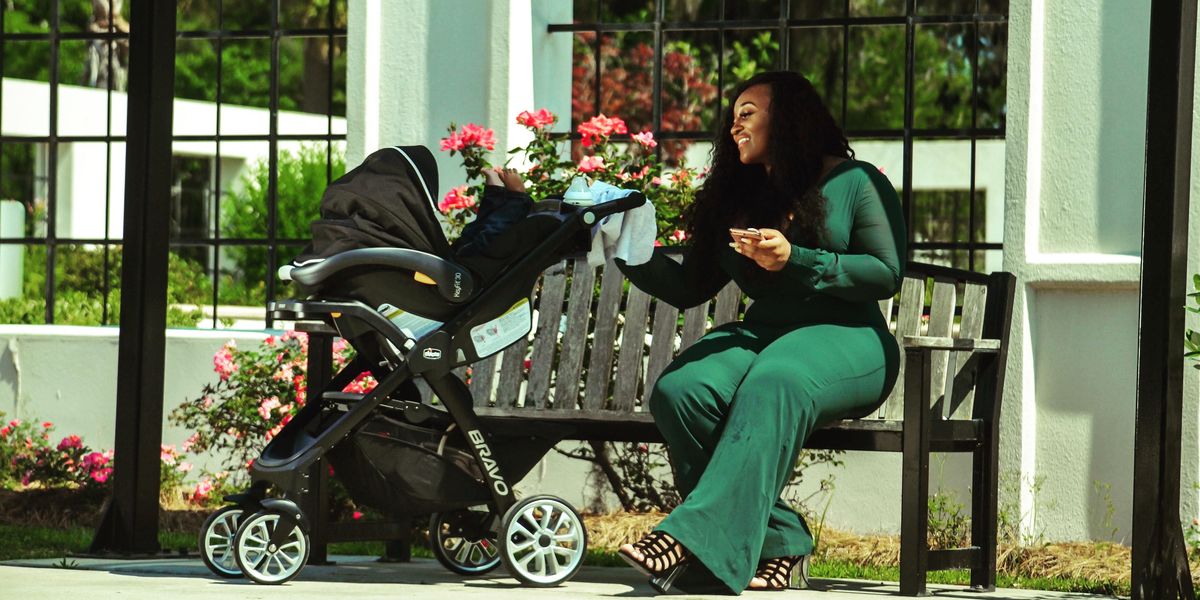
This Publicist Shares How Mothering Her Son Has Helped Her Mother Herself
In xoNecole's Finding Balance, we profile boss women making boss moves in the world and in their respective industries. We talk to them about their business, their life, and most of all, what they do to find balance in their busy lives.
There has been a lot of talk lately in our women circles about learning how to not overextend ourselves. The narrative of being "Black Superwoman'' has been ingrained in us for as long as we can remember. But I have to admit, WE ARE POPPIN' out here. Black women have been killing the game with being the most educated demographic, breaking the glass ceiling in corporate america, dominating body positivity in media/entertainment, running our own businesses, leading organizations to social justice change, and being amazing mothers to beautiful children. I mean the list goes on and on. While we have been proving for generations the resilience black women have, we still have to recognize when it is time to focus on ourselves instead of the world.
DeVynne Starks, 26, is a full-time Biomedical Targeted Marketing Program Manager for one of the world's largest humanitarian organizations and runs her own boutique PR agency, Cultiv8 PR. DeVynne understands what it feels like to work hard towards her career, while also being a full-time mom to her son. When DeVynne became a mother, she noticed that women, especially black women, experienced 'Mommy Burnout' but very few people were having the conversation. DeVynne has been very intentional and passionate about helping other moms recognize the signs of 'Mommy Burnout' and how to master balance. DeVynne believes "it's time that moms learn to take time for themselves without feeling guilty."

Courtesy of DeVynne Starks
In 2018, DeVynne Starks launched a digital platform called DeVynne Intervention. This blog was a way to build community with other moms where they discuss the good, the bad, and the ugly of motherhood. "As a black woman, you feel pushed or obligated to be successful and leave your mark in this world. Whether that means you are looking to be the first at something or the best at something. But when you are a mother, you have to figure out how to not become so distant from your child that the child ends up feeling like they are not a priority."
For this installment of "Finding Balance", xoNecole had the chance to speak with entrepreneur DeVynne about motherhood, prioritizing self-care, and the importance of keeping your faith.
xoNecole: At what point in your life did you understand the importance of pressing pause and finding balance in both your personal and professional life?
DeVynne Starks: Pressing pause has been new for me. Four years ago, after the birth of my son, if you would ask me what balance was, I would look back and ask, "What is that?" But when I realized I was doing so many things and not carving out time for myself, that was when I needed to take a moment and reassess. I have learned that balance is about happiness that comes from within. Happiness doesn't come from other people, a new job, or from becoming a mother. You have to make that conscious decision to find that inner peace to get to the stage of feeling balanced.
What are your mornings like?
With my mornings, I start with prayer and giving myself time to talk to God. Then I practice stillness, to be intentional about listening to God and hearing what He has to say. After that, I try to give myself 30 minutes of work out time. Whether that's jogging or walking around the neighborhood.
How do you wind down at night?
I love to give myself a good facial and read a good book. I also like to wind down with my son. We will watch his favorite cartoon or play with action figures. Any moment where I can dedicate one on one time with him, he really appreciates it.
"I have learned that balance is about happiness that comes from within. Happiness doesn't come from other people, a new job, or from becoming a mother. You have to make that conscious decision to find that inner peace to get to the stage of feeling balanced."

Courtesy of DeVynne Starks
When you have a busy week, what's the most hectic part of it?
The most hectic part of the day is honestly sifting through emails. It took me a really long time to not allow my inbox to negatively affect my day. I have been learning to just say "no". Saying "no" is definitely a skill you learn over time as a business owner. With practice, it gets easier and easier.
Do you practice any types of self-care? What does that look like for you?
Giving my mind and eyes a break has really been helping me. There are days when I am on the grind! So stepping away from my computer and doing something peaceful is big for me. Daily facials are definitely my me-time.
What advice do you have for busy women who feel like they don’t have time for self-care?
Even though it may seem like being busy is the right thing to do, it can really physically drain you and stress your body out. To start off, what has helped me is incorporating micro self-care techniques. One technique I use is journaling. I used to write a lot before having my son, so now I squeeze in time at the end of day to self-reflect and write it all down. This is my way to take care of myself while still being busy. I also suggest making time to just be by yourself with no shame or interruption. I had to learn how to utilize the village around me.
When I first became a mom I would tell myself, I got this! But while you do have this, you still deserve to book a hotel for the weekend, even if you stay in the room the whole time (laughs).

Courtesy of DeVynne Starks
How do you find balance with:
Friends?
With my friends, we check in on each other every week. A lot of my friends are entrepreneurs and business owners. So it can get tricky to talk to each other often. But having that line of open communication has helped us keep that balance in staying connected.
Love/Relationships?
So what I have noticed is that, the areas that you give intentional energy to, those are the areas that thrive. Granted, finding balance in dating can be difficult, but it's about being available to be intimate with someone and share quality time with them. This has helped me personally to separate from being a parent to a woman who is currently dating. Finding balance within relationships also means knowing who you are outside of them.
Health?
I have been thinking about different ways on how I can be more healthy. Last year, I was able to lose 50 pounds in less than five months. What I do now are daily tea detoxes in conjunction with the keto diet. I have been feeling so much better and I have way more energy. Setting my healthcare goals and sticking to them has really set me up for success across the board.
When you are going through a bout of uncertainty, or feeling stuck, how do you handle it?
I really pay attention to my thoughts. I honestly believe that the way you think about yourself and the world around you, creates your own reality. So changing your thoughts to what you want in life allows you to connect to your intuition. So when I do have those moments of negativity, I remind myself that these are temporary feelings. I am aware that I have to make that shift to be more positive in order to change things around me.
"I honestly believe that the way you think about yourself and the world around you, creates your own reality. When I do have those moments of negativity, I remind myself that these are temporary feelings. I am aware that I have to make that shift to be more positive in order to change things around me."
And honestly, what does success and happiness mean to you?
Success means that you understand that you are going to fail at some part in your journey. But you are resilient enough that those failures are minor and they don't become huge obstacles for you. Before I became a mother, success to me meant just getting through the day. But now success for me is striving to be the best version of myself in order to be a better mother for my son. As far as happiness, I would say, I am still navigating that.
Every day I am learning what truly makes me happy and I try to be grateful for all the good things that are happening in my life.
To learn more about DeVynne, follow her on Instagram here. Read more about how career women find balance in xoNecole's "Finding Balance" series here.
'K' is a multi-hyphenated free spirit from Chicago. She is a lover of stories and the people who tell them. As a writer, 9-5er, and Safe Space Curator, she values creating the life she wants and enjoying the journey along the way. You can follow her on Instagram @theletter__k_.
This article is sponsored by Hulu.
UnPrisonedhas returned for its highly anticipated second season, delving deeper into the complex dynamics of the Alexander family.
The series premiere comes a year after its debut season garnered rave reviews from fans and critics and earned record-breaking ratings for Hulu's Onyx Collective brand. UnPrisoned's success can be attributed to its raw, relatable themes and comedic appeal.
Inspired by creator Tracy McMillan's life, the show follows Paige (Kerry Washington), a therapist and single mother whose life takes an unexpected turn when her father, Edwin (Delroy Lindo) --who was released from prison-- moves in with her and her teenage son, Finn (Faly Rakotohavana).
Throughout UnPrisoned's first season, viewers witnessed how Edwin's incarceration deeply affected Paige's life and relationships. In the series, Paige unpacks her trauma through interactions with her inner child and her online followers. Meanwhile, Edwin is overcoming specific struggles with his own past that led to his life of crime, including a dysfunctional upbringing and his mother's arrest. As the Alexanders attempt to reconcile, new challenges arise.
This new season promises to further explore their unconventional family dynamic. Here are several compelling reasons why season two of UnPrisoned should be on everyone's watchlist.
The Alexander Family Life Is Still In Shambles
UnPrisoned's second season resumes where the series left off, with Paige grappling with the fallout from her troubled therapy practice and Edwin navigating life independently after moving out. Meanwhile, Finn faces his own challenges. The teenager is battling anxiety and seeking information about his father—a topic Paige avoids discussing.
The Alexander Family Are Attending Therapy To Resolve Their Underlying Issues
Amid the chaos in their lives, the Alexander family decides to mend their bond by confronting their past traumas. They seek professional help and attend therapy sessions with a “family radical healing coach,” played by John Stamos, a new cast member. This collective effort aims to unravel the complexities of their shared history and strengthen their relationships.
The process of unraveling each character's internal conflicts and their potential impact on future relationships may clash with Paige's textbook therapy approach. While Paige is used to being in the therapist's seat in both career and family, this forces her into the unfamiliar role of a patient during therapy sessions. This shift would compel her to look in the mirror and try a radically different approach.
The Alexander Family Learned A Big Lesson During A Therapy Session
In therapy, the Alexanders are tasked with addressing their individual traumas to salvage their remaining relationships. One of the family therapist’s eccentric suggestions was an exercise involving a family wrestling match. During this session, Paige faces tough questions about her refusal to share information about Finn's father.
While it's unclear whether this scene is reality or fantasy, the image of the family duking it out in the ring certainly makes for hilarious yet compelling television.
Paige Tries Dating Again Following Failed Relationships
Amid her life's chaos, Paige decides to step back into the dating field. However, her many attempts have left her with mixed results. The dating apps have turned out to be a fail, and an outing with her ex Mal (Marque Richardson), who is also her father's parole officer, doesn’t go quite as expected after he brings an unexpected guest – his new girlfriend.
The situation takes an awkward turn when Mal's new partner learns why the former couple split, partly due to Paige's self-sabotage.
UnPrisoned Is A Perfect Balance Of Comedy And Drama
As a dramedy, UnPrisoned takes a comedic approach to its heavy subjects. The show takes us on a ride with Paige's dating misadventures and navigating a friendship with her ex.
Other lighthearted moments include Edwin's attempts at CPR based on online videos and, of course, the antics of the Alexander family's unconventional new healing coach.
The second season of UnPrisoned is now available on Hulu.
UnPrisoned | Season 2 Trailer | Hulu
Feature image courtesy
Lip Gloss Vs. Lip Oil: MUA Chrishana Allen Breaks Down Their Differences
Lip glosses and oils play a huge role in making our lips look juicy. Each lip combo is complete once that sheer coat locks everything in. Although we adore both lip products, most of us can’t help but wonder - what is the difference? On the surface, both beauty products seem to do the same thing. At least, that’s what we think. According to makeup artist Chrishana Allen, lip glosses and lip oils may be cousins but are not twins.
There’s more to products than what’s on the surface. Each one is made up of different ingredients tailored to serve different needs. Allen explains the key differences between each product, its longevity, and how we can determine if a lip gloss or lip oil is best in our routine. With more beauty brands releasing lip oils and glosses, having insight into each product's benefits can prevent us from wasting money on products that don't satisfy our needs.
The Difference
“Lip oils and lip glosses differ in texture, color, and benefit,” says Allen. She continues to explain that lip oils nourish and protect our lips from dehydration. Similar to how body oil deeply hydrates our skin. “Conversely, lip glosses provide a super glossy finish and come in various high-pigmented colors,” adds Allen. We’ve seen an abundance of this in beauty brand launches. Fenty Beauty is one of many brands that have launched a series of lip glosses to their line. The various colors add to any makeup look, while lip oil can be worn on a casual, fresh-face day.
 Beauty Makeup GIF by e.l.f. CosmeticsGiphy
Beauty Makeup GIF by e.l.f. CosmeticsGiphyWhich One Will Provide Lasting Moisture?
It’s natural to believe lip oils are the key solution to long-lasting moisture. The real answer? It depends. According to Allen, many lip glosses on the market are formulated with hyaluronic acid and other moisturizing properties. These ingredients can help provide a level of hydration for a few hours. If you’re looking for something long-lasting, then it’s recommended that you grab your favorite lip oil. “Lip oils are made with moisturizing oils that can lock in moisture, which leaves your lips feeling more hydrated throughout the day,” says Allen.
"Lip oils are made with moisturizing oils that can lock in moisture, which leaves your lips feeling more hydrated throughout the day."

Business Insider
How Can We Decide Which Product Is Best for Our Needs?
With so many products on the market, it can be overwhelming to determine which will satisfy our needs. Allen advocates for us, asking ourselves what is most important to us to make a concrete decision. She asks us, “Do you want a product that provides a light sheen with many nourishing oils that penetrate your lips? Then go for a lip oil. Do you want to moisturize your lips with a high-quality shine and excellent color payoff? Then go for lipgloss.” Being intentional about our needs will ultimately lead us to the product that will satisfy us.
Let’s make things inbox official! Sign up for the xoNecole newsletter for love, wellness, career, and exclusive content delivered straight to your inbox.
Featured image by Michael Stewart/Corbis/VCG/Getty Images









